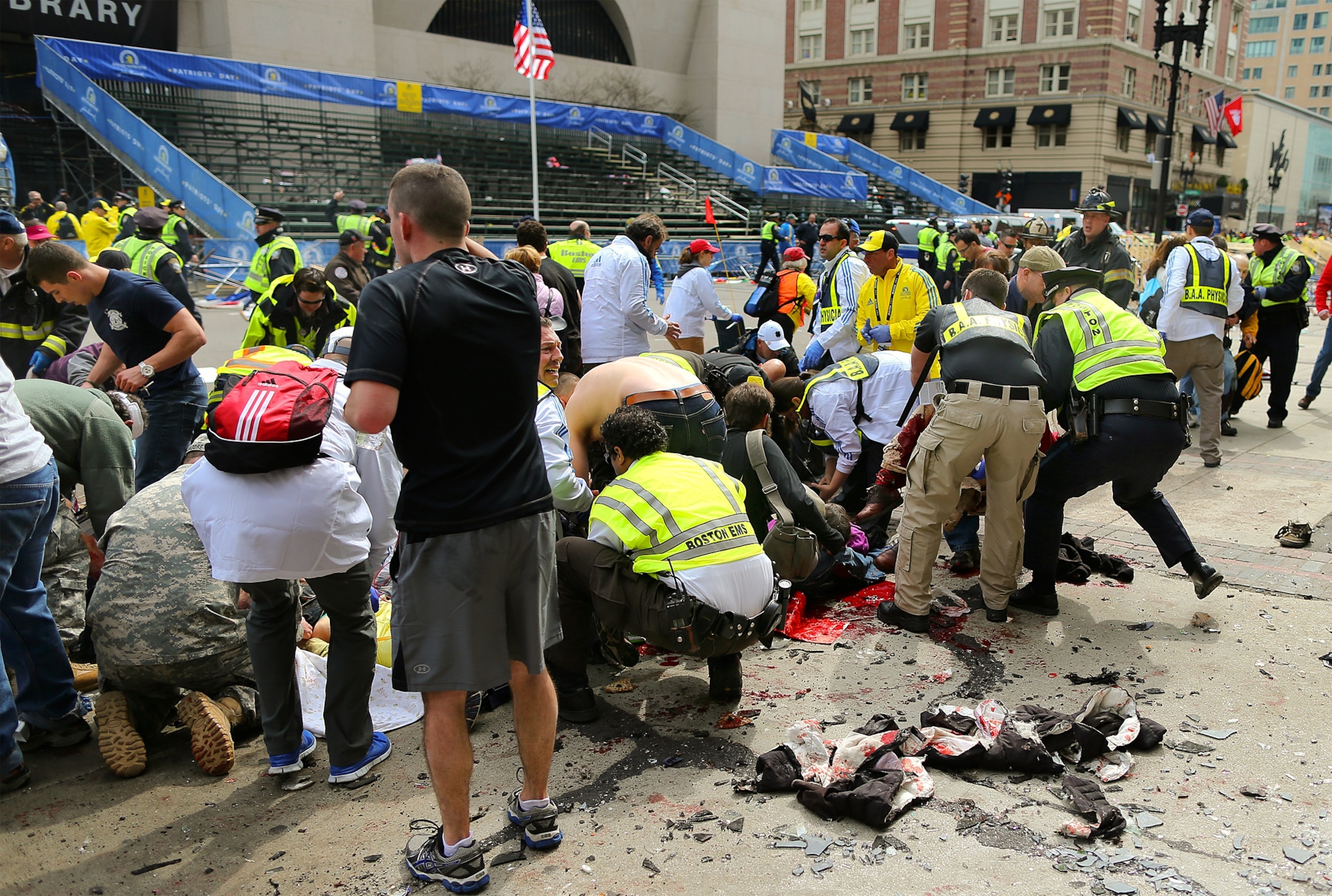
7 Other Sports-related Attacks
Unfortunately, the Boston marathon explosions aren't a unique occurrence. Many sporting events throughout the years have experienced similar attacks.
The explosions that ripped through the finish line of the Boston Marathon on Monday, killing at least two and injuring scores more, rattled an entire country.
But sporting events around the world have a long history as targets for violence. Many of the attacks have been labeled acts of terrorism, even as President Barack Obama notably avoided such language in speaking about the Boston Marathon attack on Monday night.
A list of some of the more notable attacks on sporting events:
1972 Munich Olympics
During the 1972 Munich Games, the Palestinian militant group called Black September took the Israeli national team hostage, eventually killing 11 athletes and coaches and one West German police officer.
On September 5, 1972, eight Palestinian militants invaded Olympic Village, killed two members of the Israeli team and kidnapped nine others, according to several accounts.
After a day of failed negotiations, the captors demanded transportation for them and their hostages to Cairo, Egypt. The Germans agreed to provide the flights, all the while planning a rescue attempt. It was during that attempt that the remaining hostages were killed, as well as the German police officer. Five Palestinians also died.
1996 Atlanta Olympics
At 1:20 a.m. on July 27, 1996—eight days after that year’s Summer Olympics opening ceremonies—a bomb ripped through Centennial Olympic Park, a public entertainment venue in Atlanta, Georgia. Two people died and over a hundred were injured in the blast.
Eric Rudolph, a former explosives expert for the United States Army, confessed to placing the bomb in front of a video screen in the park. He called in to 911 twice before the bomb was scheduled to go off to warn officials about the bomb, according to an interview in Sports Illustrated.
"The plan was to clear the park, and hopefully after clearing the park and the explosion, this would create a state of instability in Atlanta, potentially shut the Games down or at least eat into the profits that the Games were going to make,” Randolph said in the article. “The idea was to use them as warning devices, not to target people. ... In retrospect, it was a poor decision.”
Rudolph was caught in 2003 and is currently serving four life terms, without the possibility of parole, at a Colorado prison.
1996 Manchester Bombing
On the morning of June 15, 1996, a cargo van filled with explosives exploded in the middle of a busy shopping center in Manchester, England (map), injuring about 200 people.
England was hosting the 1996 European Football Championship that year, and a match between German and Russian soccer teams was scheduled for the next day in Manchester’s stadium.
The Irish Republican Army claimed responsibility for the 3,300-pound bomb, according to news accounts.
2002 Madrid Soccer Bombing
On May 1, 2002, a car bomb exploded near Santiago Bernabeu stadium in Madrid, Spain, just hours before Real Madrid was to play Barcelona in the European Champions League final.
A second car bomb exploded a half hour later about one mile (1.6 kilometers) away.
Basque separatist group ETA took responsibility for the attack, which injured 17 people.
Officials went ahead with the game, in which an estimated 75,000 people showed up to cheer for their teams, according to a report on CNN.
2008 Sri Lanka Marathon
On April 6, 2008, a suicide bomber detonated a device at the start of a Sri Lankan marathon in Waliweriaya (map), killing at least 15 people, including highway minister Jeyaraj Fernandopulle, according to reports in The New York Times.
The attack, blamed on the rebel group the Liberation Tigers of Tamil Eelam, also injured almost 100 people.
2009 Ambush of Sri Lankan Cricket Team
On March 3, 2009, the Sri Lankan cricket team was on its way to the Qaddafi Stadium in Lahore, Pakistan, when 12 gunmen ambushed the athletes and a van full of umpires and a referee at a traffic circle near the stadium.
Initial news accounts said eight people died in the attack—including six police officers and two bystanders—and at least six athletes were injured.
Reports from the Associated Press indicated the gunmen were armed with submachine guns, rocket-propelled grenades, pistols, 25 hand grenades, and plastic explosives. Some of the gunmen fled the scene in motorized rickshaws.
The Sri Lankan squad was one of the few international cricket teams that had decided to compete in matches hosted by Pakistan. Teams from India, Australia, and Britain had previously refused to travel to Pakistan, stating security concerns, according to The New York Times.
2010 World Cup Fans Attacked in Uganda
At 10:30 p.m. (local time) on July 11, 2010, at least three bombs exploded in Kampala, Uganda (map), near where people were watching a World Cup soccer match between Spain and the Netherlands.
According to The New York Times, at least 50 people were killed in attacks that targeted a restaurant and a large rugby field.
The Washington Post reported that militant Somali group al-Shabab, linked to al Qaeda, claimed responsibility for the attacks.